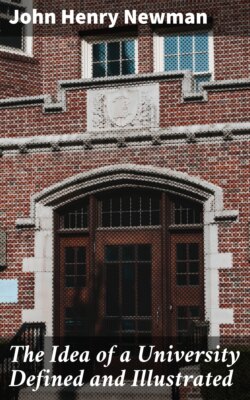Читать книгу The Idea of a University Defined and Illustrated - John Henry Newman - Страница 26
На сайте Литреса книга снята с продажи.
2.
ОглавлениеTable of Contents
Truth is the object of Knowledge of whatever kind; and when we inquire what is meant by Truth, I suppose it is right to answer that Truth means facts and their relations, which stand towards each other pretty much as subjects and predicates in logic. All that exists, as contemplated by the human mind, forms one large system or complex fact, and this of course resolves itself into an indefinite number of particular facts, which, as being portions of a whole, have countless relations of every kind, one towards another. Knowledge is the apprehension of these facts, whether in themselves, or in their mutual positions and bearings. And, as all taken together form one integral subject for contemplation, so there are no natural or real limits between part and part; one is ever running into another; all, as viewed by the mind, are combined together, and possess a correlative character one with another, from the internal mysteries of the Divine Essence down to our own sensations and consciousness, from the most solemn appointments of the Lord of all down to what may be called the accident of the hour, from the most glorious seraph down to the vilest and most noxious of reptiles.
Now, it is not wonderful that, with all its capabilities, the human mind cannot take in this whole vast fact at a single glance, or gain possession of it at once. Like a short-sighted reader, its eye pores closely, and travels slowly, over the awful volume which lies open for its inspection. Or again, as we deal with some huge structure of many parts and sides, the mind goes round about it, noting down, first one thing, then another, as it best may, and viewing it under different aspects, by way of making progress towards mastering the whole. So by degrees [pg 046] and by circuitous advances does it rise aloft and subject to itself a knowledge of that universe into which it has been born.
These various partial views or abstractions, by means of which the mind looks out upon its object, are called sciences, and embrace respectively larger or smaller portions of the field of knowledge; sometimes extending far and wide, but superficially, sometimes with exactness over particular departments, sometimes occupied together on one and the same portion, sometimes holding one part in common, and then ranging on this side or that in absolute divergence one from the other. Thus Optics has for its subject the whole visible creation, so far forth as it is simply visible; Mental Philosophy has a narrower province, but a richer one. Astronomy, plane and physical, each has the same subject-matter, but views it or treats it differently; lastly, Geology and Comparative Anatomy have subject-matters partly the same, partly distinct. Now these views or sciences, as being abstractions, have far more to do with the relations of things than with things themselves. They tell us what things are, only or principally by telling us their relations, or assigning predicates to subjects; and therefore they never tell us all that can be said about a thing, even when they tell something, nor do they bring it before us, as the senses do. They arrange and classify facts; they reduce separate phenomena under a common law; they trace effects to a cause. Thus they serve to transfer our knowledge from the custody of memory to the surer and more abiding protection of philosophy, thereby providing both for its spread and its advance:—for, inasmuch as sciences are forms of knowledge, they enable the intellect to master and increase it; and, inasmuch as they are instruments, to communicate it readily to others. Still, after all, they [pg 047] proceed on the principle of a division of labour, even though that division is an abstraction, not a literal separation into parts; and, as the maker of a bridle or an epaulet has not, on that account, any idea of the science of tactics or strategy, so in a parallel way, it is not every science which equally, nor any one which fully, enlightens the mind in the knowledge of things, as they are, or brings home to it the external object on which it wishes to gaze. Thus they differ in importance; and according to their importance will be their influence, not only on the mass of knowledge to which they all converge and contribute, but on each other.
Since then sciences are the results of mental processes about one and the same subject-matter, viewed under its various aspects, and are true results, as far as they go, yet at the same time separate and partial, it follows that on the one hand they need external assistance, one by one, by reason of their incompleteness, and on the other that they are able to afford it to each other, by reason, first, of their independence in themselves, and then of their connexion in their subject-matter. Viewed altogether, they approximate to a representation or subjective reflection of the objective truth, as nearly as is possible to the human mind, which advances towards the accurate apprehension of that object, in proportion to the number of sciences which it has mastered; and which, when certain sciences are away, in such a case has but a defective apprehension, in proportion to the value of the sciences which are thus wanting, and the importance of the field on which they are employed.
